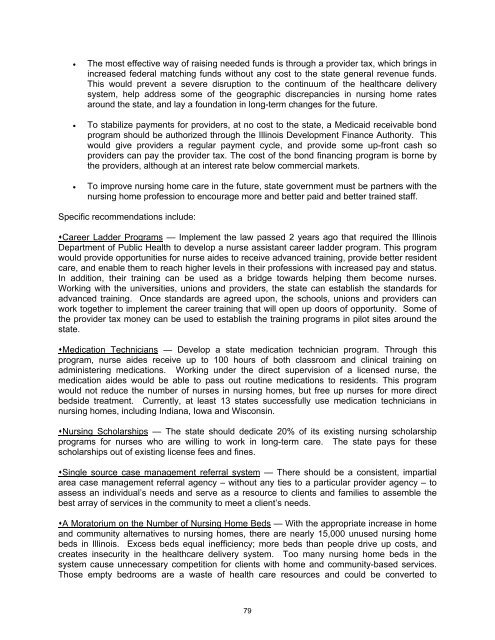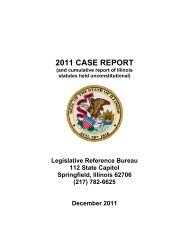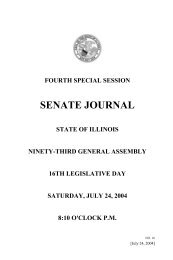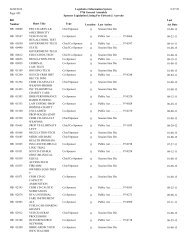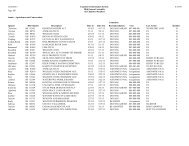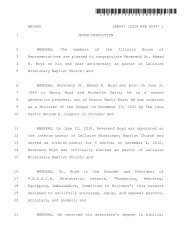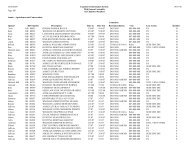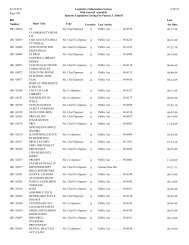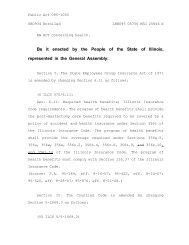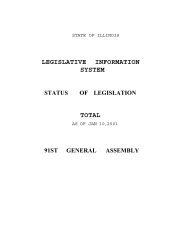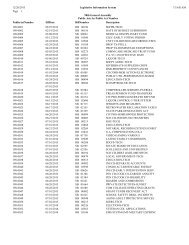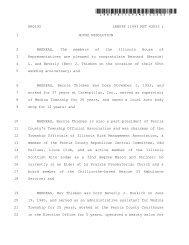Long-Term Care - Illinois General Assembly
Long-Term Care - Illinois General Assembly
Long-Term Care - Illinois General Assembly
You also want an ePaper? Increase the reach of your titles
YUMPU automatically turns print PDFs into web optimized ePapers that Google loves.
• The most effective way of raising needed funds is through a provider tax, which brings in<br />
increased federal matching funds without any cost to the state general revenue funds.<br />
This would prevent a severe disruption to the continuum of the healthcare delivery<br />
system, help address some of the geographic discrepancies in nursing home rates<br />
around the state, and lay a foundation in long-term changes for the future.<br />
• To stabilize payments for providers, at no cost to the state, a Medicaid receivable bond<br />
program should be authorized through the <strong>Illinois</strong> Development Finance Authority. This<br />
would give providers a regular payment cycle, and provide some up-front cash so<br />
providers can pay the provider tax. The cost of the bond financing program is borne by<br />
the providers, although at an interest rate below commercial markets.<br />
• To improve nursing home care in the future, state government must be partners with the<br />
nursing home profession to encourage more and better paid and better trained staff.<br />
Specific recommendations include:<br />
<strong>Care</strong>er Ladder Programs — Implement the law passed 2 years ago that required the <strong>Illinois</strong><br />
Department of Public Health to develop a nurse assistant career ladder program. This program<br />
would provide opportunities for nurse aides to receive advanced training, provide better resident<br />
care, and enable them to reach higher levels in their professions with increased pay and status.<br />
In addition, their training can be used as a bridge towards helping them become nurses.<br />
Working with the universities, unions and providers, the state can establish the standards for<br />
advanced training. Once standards are agreed upon, the schools, unions and providers can<br />
work together to implement the career training that will open up doors of opportunity. Some of<br />
the provider tax money can be used to establish the training programs in pilot sites around the<br />
state.<br />
Medication Technicians — Develop a state medication technician program. Through this<br />
program, nurse aides receive up to 100 hours of both classroom and clinical training on<br />
administering medications. Working under the direct supervision of a licensed nurse, the<br />
medication aides would be able to pass out routine medications to residents. This program<br />
would not reduce the number of nurses in nursing homes, but free up nurses for more direct<br />
bedside treatment. Currently, at least 13 states successfully use medication technicians in<br />
nursing homes, including Indiana, Iowa and Wisconsin.<br />
Nursing Scholarships — The state should dedicate 20% of its existing nursing scholarship<br />
programs for nurses who are willing to work in long-term care. The state pays for these<br />
scholarships out of existing license fees and fines.<br />
Single source case management referral system — There should be a consistent, impartial<br />
area case management referral agency – without any ties to a particular provider agency – to<br />
assess an individual’s needs and serve as a resource to clients and families to assemble the<br />
best array of services in the community to meet a client’s needs.<br />
A Moratorium on the Number of Nursing Home Beds — With the appropriate increase in home<br />
and community alternatives to nursing homes, there are nearly 15,000 unused nursing home<br />
beds in <strong>Illinois</strong>. Excess beds equal inefficiency; more beds than people drive up costs, and<br />
creates insecurity in the healthcare delivery system. Too many nursing home beds in the<br />
system cause unnecessary competition for clients with home and community-based services.<br />
Those empty bedrooms are a waste of health care resources and could be converted to<br />
79


